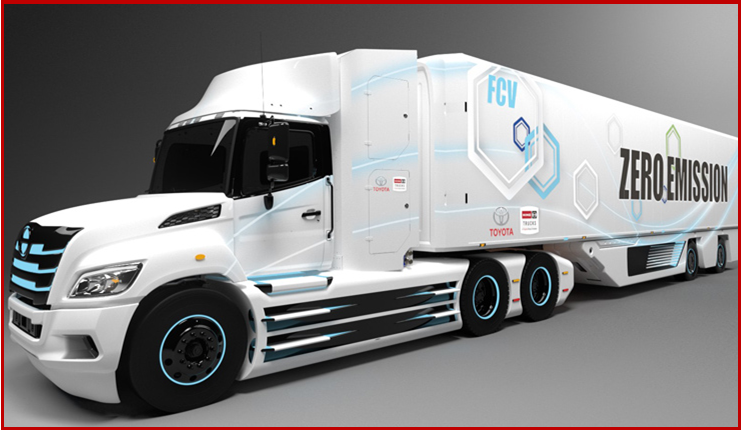
This deal expands upon the existing effort to develop a 25-ton FCET for the Japanese market announced earlier this year. It’s an obvious solution for the long-standing dirty diesel scourge.
Toyota Motor North America and Hino USA have agreed to jointly develop a Class-8 fuel-cell electric truck for the North American market. With the expanding interest in heavy-duty electric trucks, aka FCETs, prompted by government demands and the global warming crisis, it’s the latest foray into the well-funded and planet destroying fossil fuel wars by the latter day purveyors and avatars of dinosaurs – Big Oil.
The companies said today that they will leverage the newly developed Hino XL Series chassis with Toyota’s fuel cell technology to deliver “exceptional capability without harmful emissions.” The first demonstration vehicle is expected to arrive in the first half of 2021.
“It will be quiet, smooth and powerful while emitting nothing but water,” claimed Tak Yokoo, Senior Executive Engineer, Toyota Research and Development. ”
Glenn Ellis, Hino’s Senior Vice President Customer Experience, said “Hino shares a common focus with Toyota when it comes to durability, reliability, and innovation with the customer at the center of design… Expanding upon our proud heritage of the Hino powertrain, Toyota Fuel Cell Technology offers our customers a commercially viable, extended range, zero emissions vehicle in the near term.”
AutoInformed.com on:
- Toyota and Hino to Develop Heavy-Duty Fuel Cell Truck
- Michigan Joins the Swelling Carbon Neutrality Movement
- Death of the Diesel: CARB Incentives for Clean Off-Road Freight and Cargo Handling Funded by Cap and Trade
- CARB, 21 Attorneys Generals, Oakland, Los Angeles, San Francisco, New York Demand Trump Stop Clean Air Act Gutting
- CARB Increases Low-Carbon Fuel Use Regulations
- Death of the Diesel Continues: CARB Probe Prompts Recall of 500,000 Cummins Trucks


As expectations for BEV sales volumes rise, companies are defining their strategy. For more than a hundred years, automobile companies have struggled to balance building components internally or outsourcing component development and manufacturing to suppliers. GM and Volkswagen appear to be vertically integrating their BEV development. Both GM and VW are involved in battery and electric motor development and manufacture. They have also found partners to share (sell) their technology (GM with Honda, and VW with Ford). While both companies have partnerships with battery companies, they appear to be intent on vertical integrating the BEV driveline—at least for now.
Conversely, Ford and FCA appear willing to let the supply base carry the early development costs. Ford has indicated that the volumes they expect over the next several years do not make a strong business case develop the components in-house. Instead, Ford encourages the supply base to achieve scale economies and encourage competition (both cost and development) between the suppliers. FCA has been less active but will likely get strategic direction in 2021 if regulators finalize FCA’s merger with PSA. Historically, the “buy or build” decision has swung back and forth like a pendulum. As the industry develops and refines its BEV integration strategy, expect swings to continue.
– Edgar Faler, Senior Industry Analyst and Brett Smith Director, Technology at The Center for Automotive Research 10/6/20